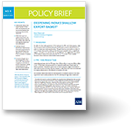
RCI-POD
WEBINAR 11
11:00am–12:30
Manila Platform: Microsoft Teams Meeting
COVID-19, Technology, and Polarizing Jobs
COVID-19 is driving economies into recession, putting many jobs at risk. Up to 242 million full-time jobs could be lost globally, with 70% of these in Asia and the Pacific. Informal employees in vulnerable sectors will be hard hit and many middle-skilled workers face being displaced into lower paying work. The pandemic will also spur a digital transformation of work and the workplace.
Video Link:
-
Link to YouTube
Downloads:
-
Agenda (PDF)
Previous Episode:
-
Capital Flows During COVID-19 Pandemic: Insights from Sectoral Capital Flows and Policy Challenges
18 Aug 2020 15:00–16:30
Manila Next Episode:
-
Supporting SME Internationalization in the New Normal
15 Sep 2020 15:00–16:30
Manila Featured publication:
-

-

- Opening Remarks:
 Ramesh Subramaniam Director General, Southeast Asia Department (SERD), Asian Development Bank (ADB)Bio
Ramesh Subramaniam Director General, Southeast Asia Department (SERD), Asian Development Bank (ADB)BioRamesh Subramaniam oversees ADB’s relationship and public sector work (including all technical assistance, knowledge generation and dissemination, and grant and loan projects) in all countries of the Association of Southeast Asian Nations (ASEAN). He is also in-charge of ADB’s support for all sub-regional cooperation initiatives in the region, including ASEAN, Brunei-Indonesia-Malaysia-Philippines East ASEAN Growth Area, Greater Mekong Subregion, and Indonesia-Malaysia-Thailand Growth Triangle.
With ADB for over 20 years, Ramesh has worked on several projects across the Asia-Pacific region. Infrastructure financing is among his primary areas of interest. He represents ADB on the World Economic Forum’s Global Future Council on long term investment and infrastructure development.
He has a Ph.D. in Economics from McMaster University (Canada), and has had post-doctoral fellowships in development economics and corporate finance and industry at Yale University (USA) and University of St. Andrews (UK).Presentation:COVID-19, Technology, and Polarizing Jobs Cyn-Young Park Director, Economic and Regional Cooperation, Department (ERCD), ADBBio Presentation
Cyn-Young Park Director, Economic and Regional Cooperation, Department (ERCD), ADBBio PresentationCyn-Young Park is Director of the Regional Cooperation and Integration Division in the Economics Research and Regional Cooperation Department of the Asian Development Bank (ADB). In her current capacity, she manages a team of economists to examine economic and policy issues related to regional cooperation and integration (RCI) and develop strategies and approaches to support RCI. During her progressive career within ADB, she has been a main author and contributor to ADB’s major publications including Asian Development Outlook (ADB’s flagship publication), Asia Capital Markets Monitor, Asia Economic Monitor, Asia Bond Monitor, and ADB Country Diagnostic Study Series. She has also participated in various global and regional forums including the G20 Development Working Group, Association of Southeast Asian Nations (ASEAN), ASEAN+3, Asia-Pacific Economic Cooperation (APEC), and Asia-Europe Meeting (ASEM). She has written and lectured extensively about the Asian economy and financial markets. Her work has been published in peer reviewed academic journals including the Journal of Banking and Finance, the Journal of Futures Markets, the Review of Income and Wealth, and the World Economy.
Prior to joining the ADB, she served as Economist (1999-2002) at the Organisation for Economic Cooperation and Development (OECD), where she contributed to the OECD Economic Outlook. She received her Ph.D. in Economics from Columbia University. She holds a bachelor degree in International Economics from Seoul National University.
 Sameer Khatiwada Technology and Innovation Specialist (Social Sectors), SERD, ADBBio Presentation
Sameer Khatiwada Technology and Innovation Specialist (Social Sectors), SERD, ADBBio PresentationSameer Khatiwada works on managing and providing ADB support in the areas of education, skills development, social protection and training. As an economist in Macroeconomic Division in ADB’s Research Department, he contributed to the flagship Asian Development Outlook. He spent close to 10 years at the International Labor Organization (ILO) where his key areas of work included labor market diagnostics, labor market institutions and policies, enterprise dynamics and migration. He holds a PhD in Economics from the IHEID in Geneva and has a master’s degree in public policy from Harvard University. Follow him on Twitter: @Khatiwada_S
Panel Discussion:Moderator: Ramesh Subramaniam Director General, Southeast Asia Department (SERD), Asian Development Bank (ADB)Bio
Ramesh Subramaniam Director General, Southeast Asia Department (SERD), Asian Development Bank (ADB)BioRamesh Subramaniam oversees ADB’s relationship and public sector work (including all technical assistance, knowledge generation and dissemination, and grant and loan projects) in all countries of the Association of Southeast Asian Nations (ASEAN). He is also in-charge of ADB’s support for all sub-regional cooperation initiatives in the region, including ASEAN, Brunei-Indonesia-Malaysia-Philippines East ASEAN Growth Area, Greater Mekong Subregion, and Indonesia-Malaysia-Thailand Growth Triangle.
With ADB for over 20 years, Ramesh has worked on several projects across the Asia-Pacific region. Infrastructure financing is among his primary areas of interest. He represents ADB on the World Economic Forum’s Global Future Council on long term investment and infrastructure development.
He has a Ph.D. in Economics from McMaster University (Canada), and has had post-doctoral fellowships in development economics and corporate finance and industry at Yale University (USA) and University of St. Andrews (UK).Panelists: Albert Francis Park Head of Department and Chair Professor of Economics, Hong Kong University of Science and TechnologyBio
Albert Francis Park Head of Department and Chair Professor of Economics, Hong Kong University of Science and TechnologyBioAlbert Park is a development and labor economist who is an expert on economic development in the People’s Republic of China (PRC). He is Head and Chair Professor of Economics, Chair Professor of Social Science, and Professor of Public Policy at HKUST. Professor Park is a Research Fellow of the Centre for Economic Policy Research (London), the Institute for the Study of Labor (IZA, Bonn), the International Growth Centre (Oxford/LSE/DFID), and the Human Capital and Economic Opportunity Working Group (Chicago). In recent years he has published articles in leading economics journals on firm performance, poverty and inequality, migration and employment, health and education, and the economics of aging in the PRC. He serves on the editorial boards of the World Bank Economic Review, Journal of Pension Economics and Finance, Cambridge University Press Elements Series in the Economics of Emerging Markets, and China Policy Journal. Prof. Park has played a leadership role in numerous survey research projects in the PRC including the China Employer-Employee Survey (CEES), the China Urban Labor Survey (CULS), the Gansu Survey of Children and Families (GSCF), and the China Health and Retirement Longitudinal Study (CHARLS). He previously held faculty appointments at the University of Michigan and Oxford University, and has consulted frequently for the World Bank. His research and commentary have appeared in the Economist, New York Times, Washington Post, Wall Street Journal, BBC, CNN, Bloomberg, Freakonomics, and NPR.
 Piotr Lewandowski President of the Board, Institute for Structural Research (IBS), WarsawBio
Piotr Lewandowski President of the Board, Institute for Structural Research (IBS), WarsawBioPiotr Lewandowski is is a labour economist and a President of the Board at Institute for Structural Research (IBS), a private research institute based in Warsaw, Poland. He is a Research Fellow at IZA, Bonn, Germany. In the past he worked at Warsaw School of Economics, and collaborated with the Ministry of Labour and Social Policy in Poland and UNDP.
His research interests include the impact of technology on jobs, occupational change and wage polarization, labour market segmentation, minimum wage, energy poverty, and the labour market effects of climate and energy policies.Q&A